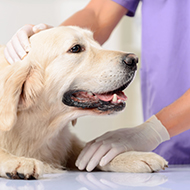Study identifies accuracy of canine portable blood glucose monitors

Although found to have potential for standard clinical use, PBGMs were inaccurate in comparison to the hexokinase reaction method.
New research comparing vet-calibrated portable blood glucose monitors for dogs has revealed the accuracy and usefulness of the AccuTell and AlphaTrak2 Portable Blood Glucose Monitors (PBGMs).
To tackle the knowledge gap on the accuracy of these monitors, and to help with the design of standards for veterinary PBGMs, researchers compared the monitors to the hexokinase reaction reference method.
Published in the Journal of Small Animal Practice (JSAP), the study aimed to determine how useful both monitors are in clinical decision making.
Nicola Di Girolamo, JSAP editor, explained the purpose of the study: “We oftentimes think that an instrument that is developed specifically for our patients will provide satisfactorily results on most occasions.
“Instead, studies such as the one presented here, are critical to understand whether the ‘numbers’ provided by an instrument are reliable for clinical use.”
Researchers found that AccuTell was more accurate for use in a clinical setting than AlphaTrak2, however, in comparison to the hexokinase reaction method, both were inaccurate.
From the research, it was found that both monitors have potential for standard clinical use, but that unexpected blood glucose concentration in dogs should be checked using the hexokinase reaction method.
Concluding, Di Girolamo said: “The authors provided 95% limits of agreements to their results. This value is of great help for clinicians, since it shows the difference expected between the instrument and the reference standard in the majority of occasions.”
The full study, 'Comparative accuracy of two veterinary-calibrated point-of-care glucometres for measurement of blood glucose concentration in dogs' is available to read on the Wiley Online Library, and is behind a paywall.



 The Veterinary Medicines Directorate (VMD) is inviting applications from veterinary students to attend a one-week extramural studies (EMS) placement in July 2026.
The Veterinary Medicines Directorate (VMD) is inviting applications from veterinary students to attend a one-week extramural studies (EMS) placement in July 2026.